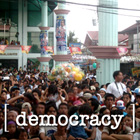
|
BELARUS PRES. THREATENS TO "WRING THE NECKS" OF OPPONENTS
OBSERVERS FEAR BLOODSHED IF STATE TRIES TO RIG ELECTION RESULTS 18 March 2006 Belarus stands as perhaps the last stronghold of truly Soviet-style dictatorial politics in Europe. Pres. Lukashenko has spent years stamping out opposition through a combination of abuses through the KGB (Belarus' secret police, which retains the Soviet-era title), jailing of dissidents, press censorship, expropriation and propaganda. Opposition to democratic means is almost total under his rule, and bloodshed is feared for election day, Sunday. Now, Aleksandr Lukashenko faces reelection and other former Soviet republics are hopeful that pressure from the international community can force democratization on one of the most authoritarian regimes in the region. Opposition leaders have planned massive rallies in the streets, to show that there are multiple voices to be heard, and to show they have the ear of the public. This has apparently inspired Pres. Lukashenko to declare "God forbid they should commit any sort of act in our country. We will wring their necks as one might a duck." In recent weeks, the regime has arrested dozens of opposition activists and refused access to international election monitors, who were turned away at the airport. The EU Observer reports an act which has exacerbated fears of official repression: Velkom, a mobile phone company owned by the Belarusian government sent an SMS message to all users "including EU embassy staff, warning of 'bloodshed' in October Square and telling people to stay away 'if you value your health.'" The head of the KGB has also reportedly warned on national television that any demonstrators will be treated as "terrorists" and will face the "maximum penalty". The signal has been clearly sent that Lukashenko's authoritarian regime is prepared to use force to prevent anything, even election results, removing it from power. The EU Observer also reports that only 11 of the 25 member states are presently represented in Minsk, and governments and the Union are ill-informed about the gravity of the political tension that could either unseat the region's most dictatorial regime or see opposition supporters attacked, jailed or killed in significant numbers. For the evening of the election, some 10,000 opposition protesters, possibly more, are planning to gather in October Square in the center of Minsk, at 8pm, to call for a fair count and to respond to official results expected to be issued at midnight. It is thought the government may try to prevent or interrupt this protest, possibly by a show of force or by mass arrests. [s]
UPDATE: In the weeks before the presidential election held in Belarus yesterday, the government of Aleksandr Lukashenko imprisoned an estimated one-third of the top campaign staff of his lead rival. Lukashenko himself and various arms of his government's propaganda apparatus openly characterized any opposition to his reelection as a threat to the nation and warned of "bloodshed" if there were protests. Utlimately, the protests did occur, but in the midst of what some have classified a "clumsy" manipulation of the balloting, which yielded an official result of 82% for Lukashenko, the bloodshed was avoided. Opposition leaders and election observers from Europe, as well as international activists, foreign diplomats and aid workers, have reported there were serious flaws in the standards both by which the election was staged and by which its outcome was determined. [Full Story] |
||||||
|
|||||||


